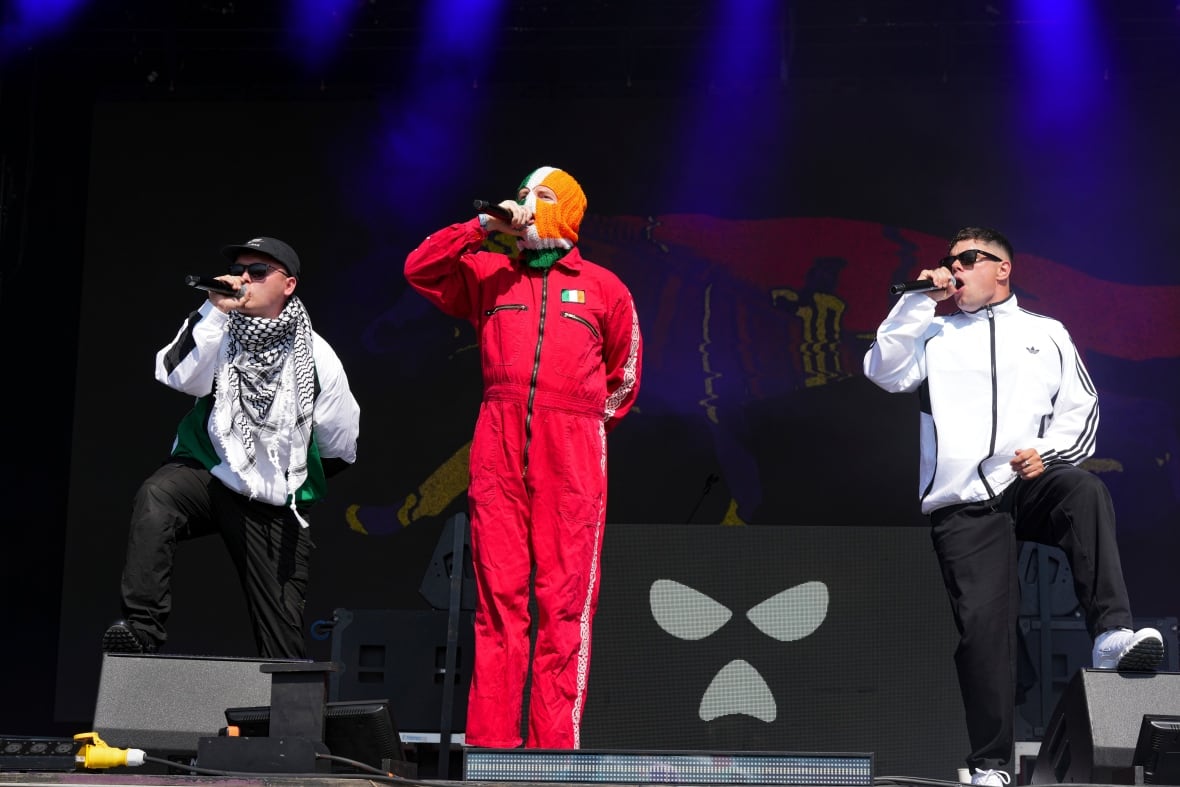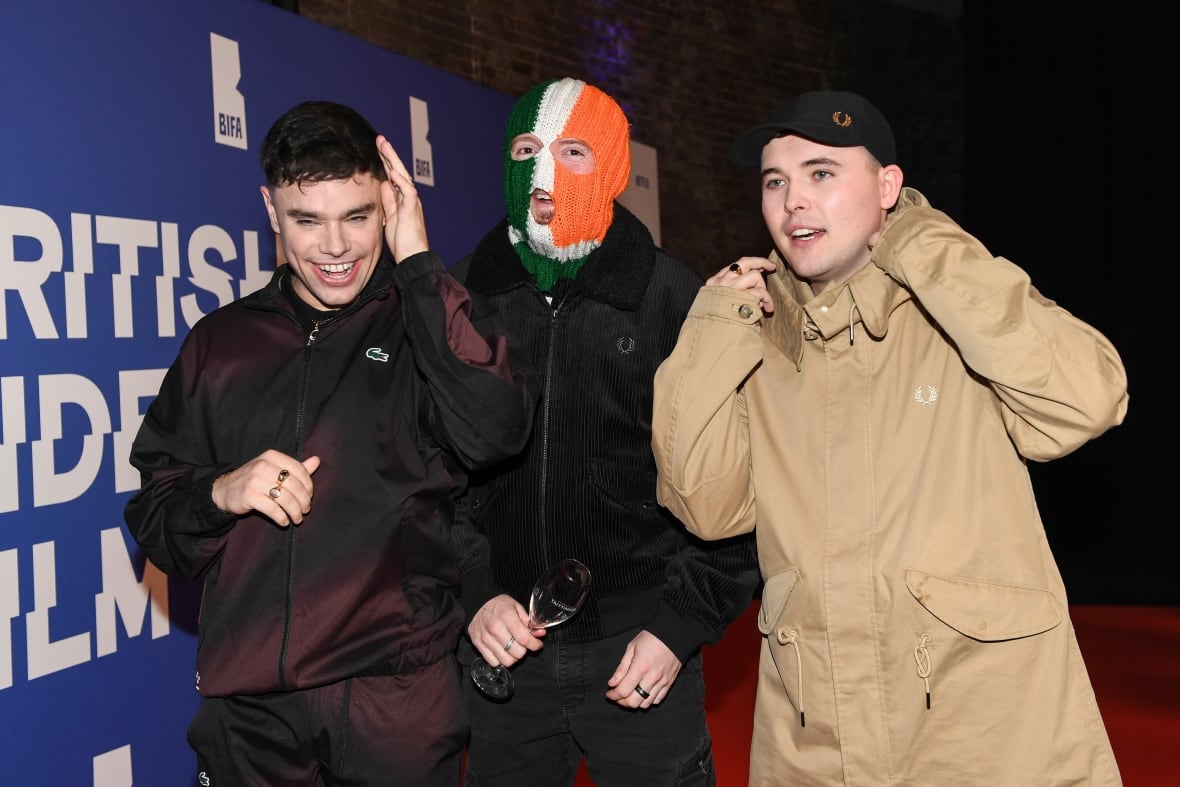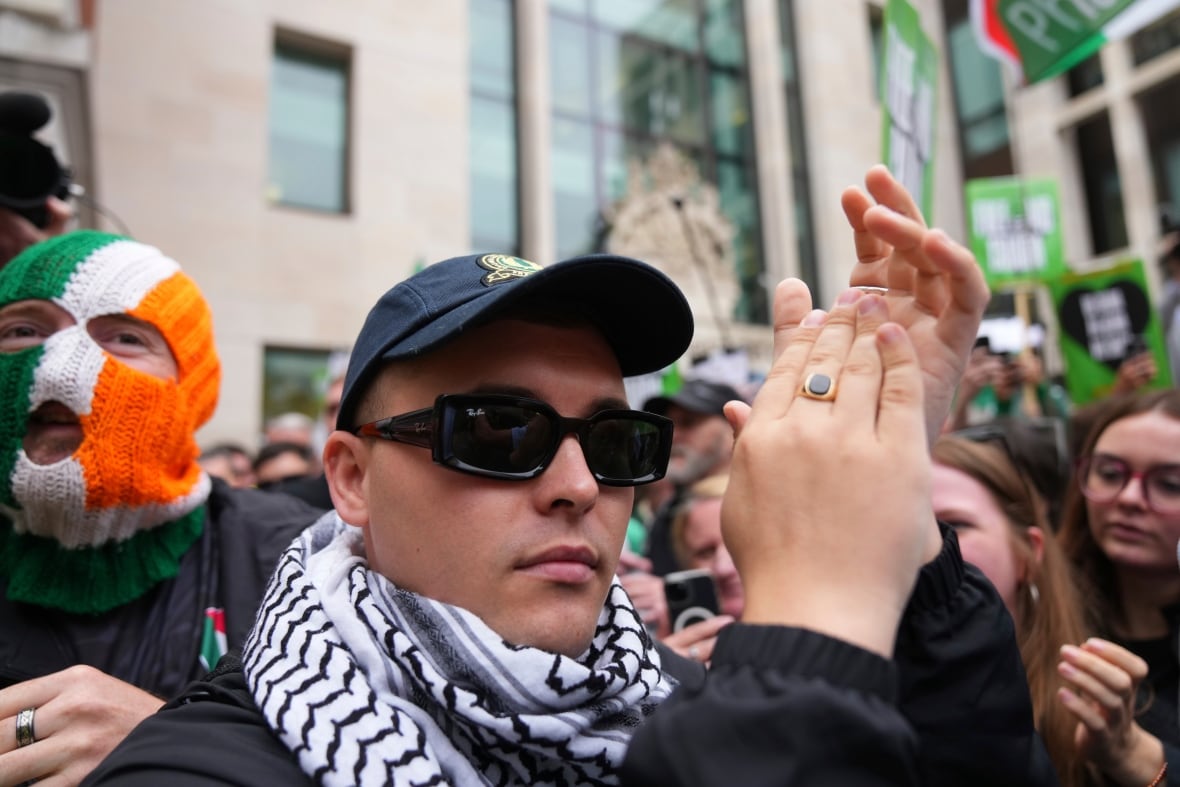Canada has banned an Irish rap group. Who is Kneecap?
The federal government banned the Irish hip-hop trio Kneecap from entering the country Friday, forcing the popular group to cancel its October shows.
The four gigs — two in Toronto and two in Vancouver — had sold out months ago.
Kneecap has been at the centre of a whirlwind of controversy in recent months, partly over public comments made at major music festivals, where the group used its platform to support Palestinians and criticize Israel's military actions in Gaza. But who is Kneecap, and how did they get here?
Origins and heritageMo Chara, Móglaí Bap and DJ Próvaí — the stage names of Liam Óg Ó hAnnaidh, Naoise Ó Cairealláin and J. J. Ó Dochartaigh, respectively — got together in Belfast, in 2017, making a brand of hip-hop fused with electronic dance music.
The name Kneecap is a play on words. It references a punishment of gunshots to the knees meted out by Irish republican paramilitaries, as well as the Irish phrase "ní cheapaim," which is pronounced similarly to "kneecap" and means "I don't think so."
The group raps in both Irish and English and has made a point of reviving the Irish language. UNESCO has classified the language as "definitely endangered" after its use dropped off over decades, due in part to forced English education.

Despite the recent controversies, most of the group's lyrics are not explicitly political and are marked by goofy, satirical humour, while its concerts are high-energy affairs with a party-like atmosphere.
"We come from a place with a lot of serious stories, trauma and PTSD for the last 30-40 years," Bap told the Los Angeles Times in 2024. "So we're political, but it's very tongue-in-cheek. We wanted to take the seriousness and the sting out of it and incorporate elements of life that we as young people enjoy — like partying and taking Class A drugs."
Early U.K. controversiesTrouble has followed the group since its inception. An Irish radio station banned its first single C.E.A.R.T.A. for profanities and drug references, and in 2019, Kneecap drew condemnation from politicians for chanting "Brits Out" at a Belfast concert the day after a royal visit.
Freeing Northern Ireland from British rule has been a focal point of the group's political messaging.
The trio uses imagery associated with Irish republicanism, a movement that advocates for the reunification of Ireland and Northern Ireland, and its members refer to themselves as "Republican Hoods." The group's most well-known song, H.O.O.D., is a play on that.
Kneecap's members have said the history of British occupation has influenced their solidarity with Palestinians living under Israeli occupation.
They have often stated their goal of fostering working-class solidarity in Northern Ireland, across religious and political affiliations.
"It's about deconstructing the systems that have created all this poverty, sectarianism, hatred and murder," Próvaí told Rolling Stone in 2024.

U.K. Secretary of State for Business and Trade Kemi Badenoch tried to block a grant awarded to Kneecap for a film last year, saying the grant should not be awarded "to people that opposed the United Kingdom itself." The group filed a discrimination case against the government and won, donating the grant money to youth groups in Northern Ireland.
The resulting movie, an acclaimed semi-biographical comedic drama simply titled Kneecap, became the first Irish-language film to premiere at the Sundance Film Festival.
Terrorism chargesThe group's growing success exploded into international notoriety following its April 2025 set at California's Coachella Festival, after displaying a series of messages on stage that included, "Israel is committing genocide against the Palestinian people" and "F--k Israel, Free Palestine."
Amid the ensuing backlash, U.K.-based Jewish group Campaign Against Antisemitism reported Kneecap to counter-terrorism police, submitting videos from previous concerts with controversial moments.
A November 2024 video allegedly showed Chara holding up a Hezbollah flag, representing the Lebanese political party and paramilitary group that the U.K. and Canada designate as a terrorist organization. That video led to a terrorism charge from the U.K. government in May, in a case that is before the courts.
Chara has said the flag was thrown onto the stage and Kneecap have said they "do not, and have never, supported Hamas or Hezbollah."
In response to the charge, the band wrote in a statement, "What's the objective? To restrict our ability to travel. To prevent us speaking to young people across the world. To silence voices of compassion. To prosecute artists who dare speak out.
"Instead of defending innocent people, or the principles of international law they claim to uphold, the powerful in Britain have abetted slaughter and famine in Gaza, just as they did in Ireland for centuries."

The band again caused a stir with a June performance at the U.K.'s Glastonbury festival, leading the crowd in chants of "Free Mo Chara" and "F--k Keir Starmer," the U.K. prime minister, in front of a sea of Palestinian flags. The BBC cut Kneecap's performance from its live broadcast of the festival.
In July, the Hungarian government banned Kneecap for three years ahead of a scheduled festival performance, saying the group "posed a national security threat."
In August, Kneecap cancelled a 15-date U.S. tour because of its proximity to Chara's court dates.

And on Friday, Vince Gasparro, Canada's parliamentary secretary for combatting crime, said in a video on X that the group was banned from entering the country, claiming Kneecap has "amplified political violence and publicly displayed support for terrorist organizations such as Hezbollah and Hamas."
Kneecap responded in a statement, saying the allegations are "wholly untrue and deeply malicious," and said they will take legal action against Gasparro.
cbc.ca



